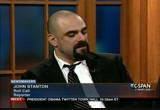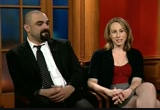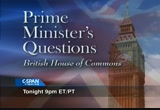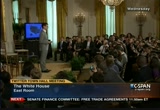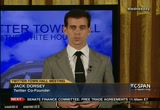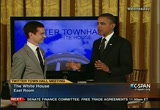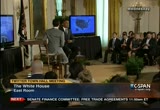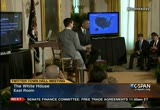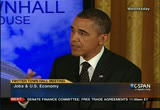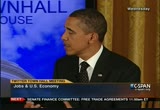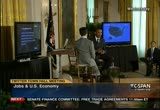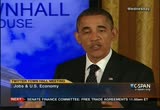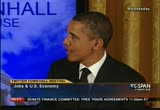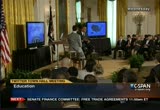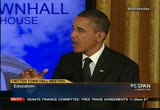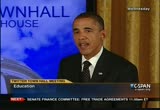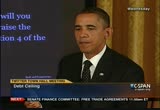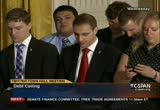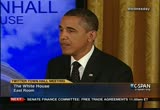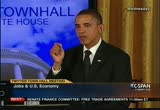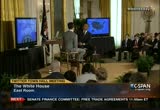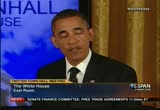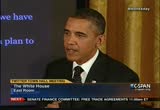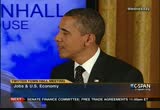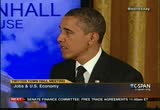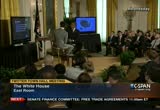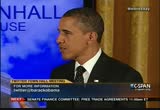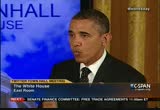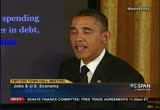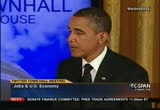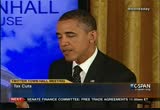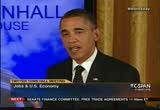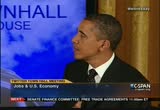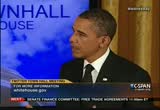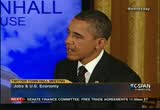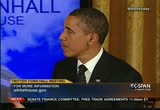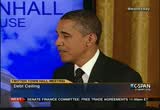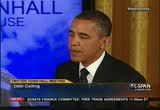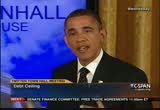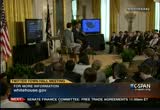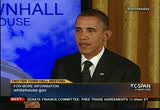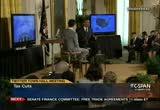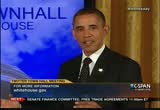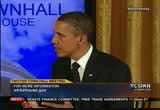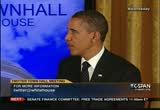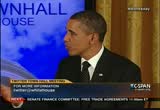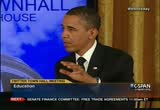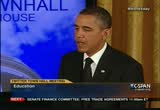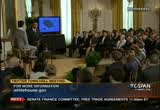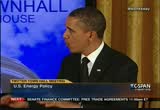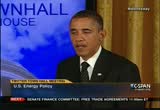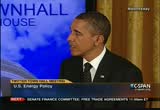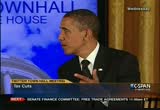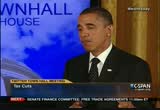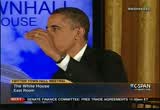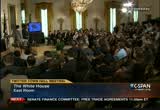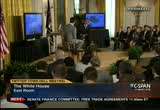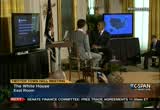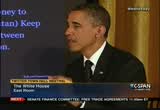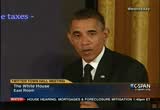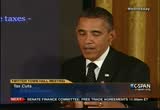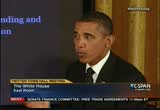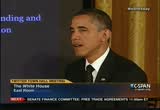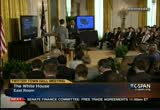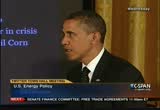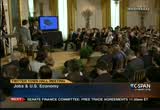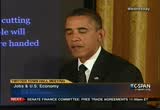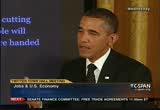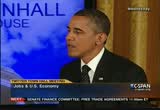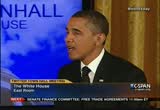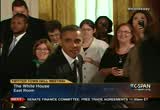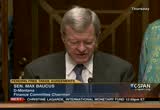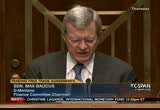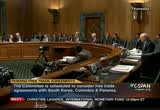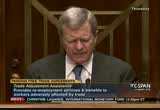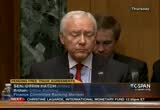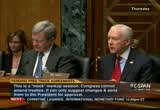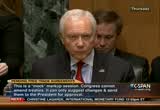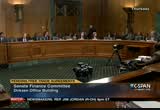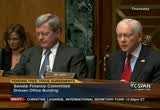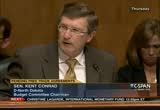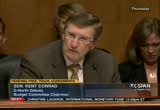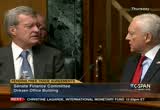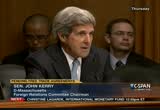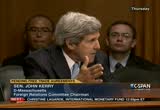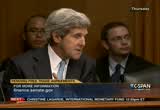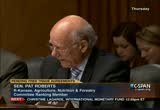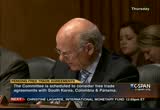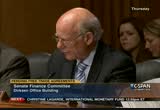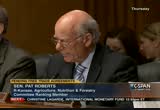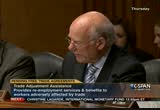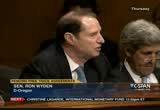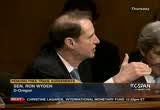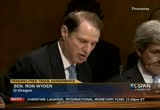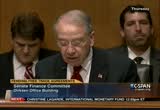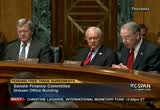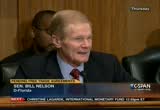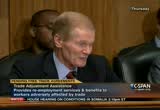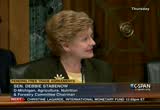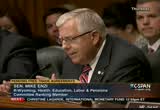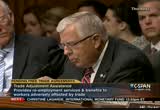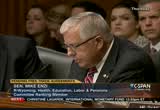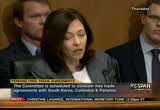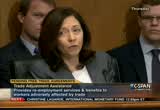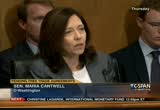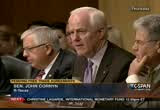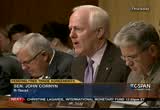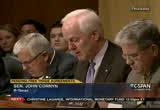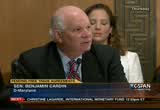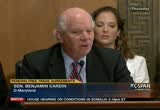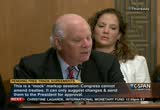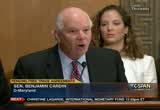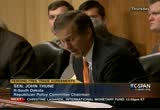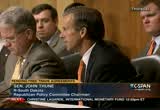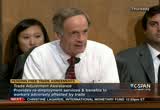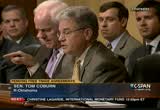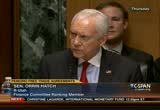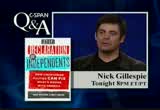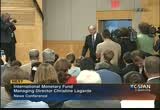tv C-SPAN Weekend CSPAN July 10, 2011 10:30am-1:00pm EDT
10:30 am
in the talks, both leaders realize they will have to make compromises. that is a sense i get from sources inside the room. both parties are under a lot of. pressure the white house and speaker john boehner have indicated great concern over what would happen to the economy if the company -- of the country did not raise the debt ceiling by the deadline. you have 9.2% unemployment that can out on friday. that ratchets up the pressure on both parties since nobody wants to see a down turn. to see a down turn. >> the president meets this evening with democratic republican leaders at the white house. after talks over the weekend, they will try to get closer. what happens after this evening's meeting going forward into next week? >> we will see some more talks.
10:31 am
i suspect both sides will try to keep the details as much as possible to themselves to the last moment. republicans and democrats will then try to sell to the members. john boehner will not hand it off and say it has to be done in a couple of hours. his members have been very unhappy. >> this was to keep the government running? >> right, his members felt like they got sold a raw deal. they felt they did not have enough time to read it. enough time to read it. they will make sure the motion gets scored and that could be a big pickup in this whole process. that allows things to die. >> that will give them three days to hate it. >> you don't want to deal hanging out there so long because hit a pi like anata.
10:32 am
you don't want rank-and-file members to feel like it was crammed down their throats striking that balance on the timing will be critical. >> the deadline to get some the to the floor is what to t? the house republicans announced they canceled one of their work. in their district. >> economists have told me that you will start to seek markets get a little spooked. by the end of next week or early the following week. that is something that will make it from both sides want to avoid. >> does that put more pressure on them? >> absolutely. >> in the week after, they will need a couple of days to debate it in the house and the senate could do it within hours if they have an agreement. if no one tries to filibuster, it will be fairly quick. they should probably start the debate by this week. >> thank you for being part of
10:33 am
our program. [captioning performed by national captioning institute] [captions copyright national cable satellite corp. 2011] >> who is really going to get fired up over nancy pelosi or john boehner? they are proxies' for the incredibly narrow range of choice that we actually have in the elected officials. >> in the declaration of independence, reason tv editor in chiefnick gillespie takes on the problems of the two-party system. that is tonight on c-span "q &a." >> this week, british prime minister david cameron discusses the public outcry over allegations that journalists at the british news paper"news of the world" hacked into the cell phones of victims of crime and their families. if the promises that a public inquiry is needed to investigate the allegations.
10:34 am
their work -- there are also k questionedni onfe crime and health care services and you keg. "prime minister of"questions tonight on c-span. president obama kicked off his first twitter town hall meeting thursday t awet which said in order to reduce the deficit, which cost which a cut in which investment would you keep? it set the tone. the twitter curator selected questions for the present and he answered verbally and from a live audience in the white house east room. this is just over one hour. this is just over one hour. >> co-founder of twitter, jack
10:36 am
mr. dorsey: good afternoon and welcome to the white house. i am jack dorsey, from twitter. through more than 200 million tweets per day, people around the world use twitter to instantly connect to what's most meaningful to them. in every country -- egypt and japan, the uk and the united states -- much of this conversation is made up of everyday people engaging in spirited debate about the future of their countries. our partners at salesforce radian6 studied more than a million tweets, discussing our nation's politics over the recent weeks, and they found that america's financial security to be one of the most actively talked about topics on twitter. they further found that president obama's name comes up in more than half of these conversations. and so today this vibrant discussion comes here to the white house and you get to ask the questions. to participate, just open your web browser and go to askobama.twitter.com. neither the president or i know the questions that will be asked today. that decision is driven entirely by the twitter users. and so let's get the
10:37 am
conversation started. ladies and gentlemen, the president of the united states. (applause.) the president: hello, everybody! (applause.) first of all, everybody can sit down. (laughter.) it's much easier to tweet from a seated position. (laughter.) mr. dorsey: and i understand you want to start the conversation off with a tweeter yourself. the president: i'm going to make history here as the first president to live tweet. so we've got a computer over here. (types in tweet.) mr. dorsey: it's only 140 characters. (laughter.) the president: all right, i think i have done this properly. but here's the test. mr. dorsey: and you tweeted. the president: how about that? not bad. (applause.) thank you. so i think my question will be coming up at some point. mr. dorsey: so what was your question? here it is.
10:38 am
the president: here's the question: "in order to reduce the deficit, what costs would you cut and what investments would you keep?" and the reason i thought this was an important question is, as all of you know, we are going through a spirited debate here in washington, but it's important to get the whole country involved, in making a determination about what are the programs that can help us grow, can create jobs, improve our education system, maintain our clean air and clean water, and what are those things that are a waste that we shouldn't be investing in because they're not helping us grow or create jobs or creating new businesses. and that debate is going to be heating up over the next couple of weeks, so i'd love to hear from the american people, see what thoughts they have. mr. dorsey: excellent. well, first question comes from a curator in new hampshire. and we have eight curators around the country helping us pick tweets from the crowd so that we can read them to the president.
10:39 am
and this one comes from william smith: "what mistakes have you made in handling this recession and what would you do differently?" the president: that's a terrific question. when i first came into office we were facing the worst recession since the great depression. so, looking around this room, it's a pretty young room -- it's certainly the worst recession that we've faced in our lifetimes. and we had to act quickly and make some bold and sometimes difficult decisions. it was absolutely the right thing to do to put forward a recovery act that cut taxes for middle-class folks so they had more money in their pocket to get through the recession. it was the right thing to do to provide assistance to states to make sure that they didn't have to lay off teachers and cops and firefighters as quickly as they needed to. and it was the right thing to do to try to rebuild our infrastructure and put people back to work building roads and bridges and so forth. it also was the right thing to do, although a tough decision, to save the auto industry, which is now profitable and gaining market
10:40 am
share -- the u.s. auto industry -- for the first time in a very long time. i think that -- probably two things that i would do differently. one would have been to explain to the american people that it was going to take a while for us to get out of this. i think even i did not realize the magnitude, because most economists didn't realize the magnitude, of the recession until fairly far into it, maybe two or three months into my presidency where we started realizing that we had lost 4 million jobs before i was even sworn in. and so i think people may not have been prepared for how not have been prepared for how long this was going to take and why we were going to have to make some very difficult decisions and choices. and i take responsibility for that, because setting people's expectations is part of how you end up being able to respond well. the other area is in the
10:41 am
area of housing. i think that the continuing decline in the housing market is something that hasn't bottomed out as quickly as we expected. and so that's continued to be a big drag on the economy. we've had to revamp our housing program several times to try to help people stay in their homes and try to start lifting home values up. but of all the things we've done, that's probably been the area that's been most stubborn to us trying to solve the problem. mr. dorsey: mr. president, 27 percent of our questions are in the jobs category, as you can see from the screen over here. our next question has to do about jobs and technology. it comes from david: "tech and knowledge industries are thriving, yet jobs discussion always centers on manufacturing. why not be realistic about jobs?" the president: well, it's not an either/or question; it's a both/and question. we have to be successful at the cutting- edge industries of the future like twitter. but we also have always been a country that
10:42 am
makes stuff. and manufacturing jobs end up having both higher wages typically, and they also have bigger multiplier effects. so one manufacturing job can support a range of other jobs -- suppliers and the restaurant near the plant and so forth. so they end up having a substantial impact on the overall economy. what we want to focus on is advanced manufacturing that combines new technology, so research and development to figure out how are we going to create the next twitter, how are we going to create the next google, how are we going to create the next big thing -- but make sure that production is here. so it's great that we have an apple that's creating ipods, ipads and designing them and creating the software, but it would be nice if we're also making the ipads and the ipods here in the united states,
10:43 am
because that's some more jobs that people can work at. and there are going to be a series of decisions that we've got to make. number one, are we investing in research and development in order to emphasize technology? and a lot of that has to come from government. that's how the internet got formed. that's how gps got formed. companies on their own can't always finance the basic research because they can't be assured that they're going to get a return on it. number two, we've got to drastically improve how we train our workforce and our kids around math and science and technology. number three, we've got to have a top-notch infrastructure to support advanced manufacturing, and we've got to look at sectors where we know this is going to be the future. something like clean energy, for example. for us not to be the leaders in investing in clean energy manufacturing so that wind turbines and solar panels are not only designed here in the united states but made here in the united states makes absolutely no sense. we've got
10:44 am
to invest in those areas for us to be successful. so you can combine high-tech with manufacturing, and then you get the best of all worlds. mr. dorsey: you mentioned education. there's a lot of questions coming about education and its impact on the economy. this one in particular is from a curator who is pulling from a student in ohio, named dustin: "higher ed is necessary for a stronger economy, but for some middle-class americans it's becoming too expensive. what can be done?" the president: well, here is some good news. we've already done something that is very significant, and people may not know. as part of a higher education package that we passed last year, what we were able to do was to take away subsidies that were going to banks for serving as middlemen in the student loan program and funnel that to help young people, through pell grants and lower rates on student loans. and so there are millions of
10:45 am
students who are getting more affordable student loans and grants as a consequence of the steps that we've already taken. this is about tens of billions of dollars' worth of additional federal dollars that were going to banks are now going to students directly. in addition, what we've said is that starting in 2013, young people who are going to college will not have to pay more than 10 percent of their income in repayment. and that obviously helps to relieve the burden on a lot students -- because, look, i'm a guy who had about $60,000 worth of debt when i graduated from law school, and michelle had $60,000. and so we were paying a bigger amount every month than our mortgage. and we did that for eight, 10 years. so i know how burdensome this can be. i do think that the universities still have a role in trying to keep their costs down. and i think that it's
10:46 am
important -- even if we've got better student loan programs, more grants, if the costs keep on going up then we'll never have enough money, you'll never get enough help to avoid taking on these huge debts. and so working with university presidents to try to figure out, where can you cut costs -- of course, it may mean that the food in the cafeteria is a little worse and the gym is not as fancy. but i think all of us have to figure out a way to make sure that higher education is accessible for everybody. one last point -- i know, twitter, i'm supposed to be short. (laughter.) but city -- community colleges is a huge, under-utilized resource, where what we want to do is set up a lifelong learning system where you may have gotten your four- year degree, but five years out you decide you want to go into another field or you want to brush up on new technologies that are going to help you advance. we need to create a system where you can
10:47 am
conveniently access community colleges that are working with businesses to train for the jobs that actually exist. that's a huge area where i think we can make a lot of progress. mr. dorsey: you mention debt a lot. that's come up in conversation a lot recently, especially in some of our recent questions, specifically the debt ceiling. and this is formulated in our next question from renegadenerd out of atlanta: "mr. president, will you issue an executive order to raise the debt ceiling pursuant to section 4 of the 14th amendment?" the president: can i just say, renegadenerd, that picture is -- captures it all there. (laughter.) he's got his hand over there, he's looking kind of confused. (laughter.) let me, as quickly as i can, describe what's at stake with respect to the debt ceiling. historically, the united states, whenever it has a deficit, it finances that deficit through the sale of treasuries. and this is a very
10:48 am
common practice. over our lifetimes, typically the government is always running a modest deficit. and congress is supposed to vote on the amount of debt that treasury can essentially issue. it's a pretty esoteric piece of business; typically has not been something that created a lot of controversy. lot of controversy. what's happening now is, is that congress is suggesting we may not vote to raise the debt ceiling. if we do not, then the treasury will run out of money. it will not be able to pay the bills that are owing, and potentially the entire world capital markets could decide, you know what, the full faith and credit of the united states doesn't mean anything.
10:49 am
and so our credit could be downgraded, interest rates could go drastically up, and it could cause a whole new spiral into a second recession, or worse. so this is something that we shouldn't be toying with. we shouldn't be toying with. what dexter's question referred to was there are some people who say that under the constitution, it's unconstitutional for congress not to allow treasury to pay its bills and are suggesting that this should be challenged under the constitution. i don't think we should even get to the constitutional issue. congress has a responsibility to make sure we pay our bills. we've always paid them in the past. the notion that the u.s. is going to default on its debt is just irresponsible. and my expectation is, is that over the next week to two weeks, that congress, working with the white house, comes up with a deal that solves our deficit,
10:50 am
solves our debt problems, and makes sure that our full faith and credit is protected. mr. dorsey: so back to jobs. we have a question from new york city about immigrant entrepreneurs: "immigrant entrepreneurs can build companies and create jobs for u.s. workers. will you support a startup visa program?" the president: what i want to do is make sure that talented people who come to this country to study, to get degrees, and are willing and interested in starting up businesses can do so, as opposed to going back home and starting those businesses over there to compete against the united states and take away u.s. jobs. so we're working with the business community as well as the entrepreneurial community to figure out are there ways that we can streamline the visa system so if you are studying here, you've got a phd in
10:51 am
computer science or you've got a phd in engineering, and you say i'm ready to invest in the united states, create jobs in the united states, then we are able to say to you, we want you to stay here. and i think that it is possible for us to deal with this problem. but it's important for us to look at it more broadly. we've got an immigration system that's broken right now, where too many folks are breaking the law but also our laws make it too hard for talented people to contribute and be part of our society. and we've always been a nation of laws and a nation of immigrants. and so we need comprehensive immigration reform, part of which would allow entrepreneurs and high-skilled individuals to stay here -- because we want to be attracting that talent here. we don't want that -- we don't want to pay for training them here and then having them benefit other countries. mr. dorsey: our next question was just -- was sent just an hour ago and touches on alternative energy and job alternative energy and job creation: "will you focus on
10:52 am
promoting alternative energy industries in oil states like louisiana and texas?" the president: i want to promote alternative energy everywhere, including oil states like louisiana and texas. this is something that i'm very proud of and doesn't get a lot of attention. we made the largest investment in clean energy in our history through the recovery act. and so we put forward a range of programs that provided credits and grants to provided credits and grants to startup companies in areas like creating wind turbines, solar panels. a great example is advanced battery manufacturing. when i came into office, advanced batteries, which are used, for example, in electric cars, we only accounted for 2 percent of the world market in advanced batteries. and we have quintupled our market share, or even gone further, just over the last two years. and we're
10:53 am
projecting that we can get to 30 to 40 percent of that market. that's creating jobs all across the midwest, all across america. and whoever wins this race on advanced battery manufacturing is probably going to win the race to produce the cars of the 21st century. china is 21st century. china is investing in it. germany is investing in it. we need to be investing in it as well. mr. dorsey: i wanted to take a moment and point out the map just behind you. these are tweets coming in, in real time, and these are questions being asked right now. and it flips between the various categories that we've determined and also just general askobama questions. so our next question is coming up on the screen now, from patrick: "mr. president, in several states we have seen people lose their collective bargaining rights. do you have a plan to rectify this?" the president: the first thing i want to emphasize is that collective bargaining is the reason why the vast majority of americans enjoy a minimum wage, enjoy weekends,
10:54 am
enjoy overtime. so many things enjoy overtime. so many things that we take for granted are because workers came together to bargain with their employers. now, we live in a very competitive society in the 21st century. and that means in the century. and that means in the private sector, labor has to take management into account. if labor is making demands that make management broke and they can't compete, then that doesn't do anybody any good. in the public sector, what is true is that some of the pension plans that have been in place and the health benefits that are in place are so out of proportion with what's happening in the private sector that a lot of taxpayers start feeling resentful. they say, well, if i don't have health care where i only have to pay $1 for prescription drugs, why is it that the person whose salary
10:55 am
i'm paying has a better deal? what this means is, is that all of us are going to have to make some adjustments. but the principle of collective bargaining, making sure that people can exercise their rights to be able to join together with other workers and to negotiate and kind of even the bargaining power on either side, that's something that has to be protected. and we can make these adjustments in a way that are equitable but preserve people's collective bargaining rights. so, typically, the challenges against bargaining rights have been taking place at the state level. i don't have direct control over that. but what i can do is to speak out forcefully for the principle that we can make these adjustments that are necessary during these difficult fiscal times, but do it in a way that preserves collective bargaining rights. and certainly at the federal level where i do have influence, i can make sure that we make these
10:56 am
adjustments without affecting people's collective bargaining rights. i'll give you just one example. we froze federal pay for federal workers for two years. now, that wasn't real popular, as you might imagine, among federal workers. on the other hand, we were able to do that precisely because we wanted to prevent layoffs and we wanted to make sure that we sent a signal that everybody is going to have to make some sacrifices, including federal workers. by the way, people who work in the white house, they've had their pay frozen since i came in, our high-wage folks. so they haven't had a raise in two and a half years, and that's appropriate, because a lot of ordinary folks out there haven't, either. in fact, they've seen their pay cut in some cases. mr. dorsey: mr. president, 6 percent of our questions are coming in about housing, which you can see in the graph behind me. and this one in particular has to do with personal debt and housing: "how will admin work to help underwater homeowners who aren't behind in payments but are trapped in homes they can't
10:57 am
sell?" from robin. the president: this is a great question. and remember, i mentioned one of our biggest challenges during the course of the last two and a half years has been dealing with a huge burst of the housing bubble. what's happened is a lot of folks are underwater, meaning their home values went down so steeply and so rapidly that now their mortgage, the amount they owe, is a lot more than the assessed worth of their home. and that obviously burdens a lot of folks. it means if they're selling, they've got to sell at a massive loss that they can't afford. it means that they don't feel like they have any assets because the single biggest asset of most americans is their home. so what we've been trying to do is to work with the issuers of the mortgages, the banks or the service companies, to convince them to work with
10:58 am
homeowners who are paying, trying to do the right thing, trying to stay in their homes, to see if they can modify the loans so that their payments are lower, and in some cases, maybe even modify their principal, so that they don't feel burdened by these huge debts and feel tempted to walk away from homes that actually they love and where they're raising their families. we've made some progress. we have, through the programs that we set up here, have probably seen several million home modifications either directly because we had control of the loan process, or because the private sector followed suit. but it's not enough. and so we're going back to the drawing board, talking to banks, try to put some pressure on them to work with people who have mortgages to see if we can make further adjustments,
10:59 am
modify loans more quickly, and also see if there may be circumstances where reducing principal is appropriate. mr. dorsey: and our next question comes from someone you may know. this is speaker boehner. the president: oh, there you go. (laughter.) mr. dorsey: "after embarking on a record spending binge that left us deeper in debt, where are the jobs?" and i want to note that these characters are his fault. (laughter.) the president: first of all -- mr. dorsey: not his fault, not his fault. the president: -- john obviously needs to work on his typing skills. (laughter.) well, look, obviously john is the speaker of the house, he's a republican, and so this is a slightly skewed question. (laughter.) but what he's right about is that we have not seen fast enough job growth seen fast enough job growth relative to the need. i mean,
11:00 am
we lost, as i said, 4 million jobs before i took office, before i was sworn in. about 4 million jobs were lost in the few months right after i took office before our economic policies had a chance to take any effect. over the last 15 months, we have seen 2 million jobs created in the private sector. each month, we are seeing growth in jobs. we have and 8 million job hole in their only filling it with 2000 jobs a month, that is way too long for a lot of folks still out of work. there are a couple of things we can continue to do. i have worked with speaker
11:01 am
boehner to pass an extra tax cut that puts extra money in the pockets of almost every single american. that means that they are spending money. businesses have more customers. that has helped to improve overall growth. we have provided at least 16 tax cuts to small businesses who have needed a lot of help and have been struggling. that includes saying zero capital gains taxes on start- ups. we want to encourage new companies, young entrepreneurs to get out there and start their businesses so they can put money back into their businesses. we have been able to cooperate with republicans on a range of issues.
11:02 am
there are some areas where republicans have been more resistant to corporate a record operating. -- more resistant to cooperating even the most people think it is a good idea. we have infrastructure that needs to be rebuilt. roads, bridges, sewer lines, water mains, the air traffic control system does not make sense. we do not have the kind of electric grid that is smart, meaning it does not waste a lot of energy in transmission. our broadband system is slower than a lot of countries. for us to move forward on a major infrastructure initiative where we are putting people to work who were disproportionately unemployed when the housing bubble went bust, to put them to work rebuilding america when
11:03 am
interest rates are low and contractors are looking for work and the need is there, that is something that could make a huge positive impact on the economy overall. it is an example of making an investment now that has huge payoffs down the road. we've not got the kind of cooperation i would like to see, but i will keep on trying. eventually, i am sure the speaker will see the light. [laughter] >> speaking of start-ups, there are a ton of questions about how they help with job creation. what incentives are you willing to support to improve small- business growth? >> i just mentioned some tax breaks we have provided to small businesses and in some cases to big businesses. if they are making investments in plants and equipment this year, they can fully write down
11:04 am
those costs. they can essentially depreciate those costs this year. that saves them a pretty big tax bill. we're already initiating a bunch of steps. the biggest challenge i hear the biggest challenge i hear from small businesses right now has to do with financing. a lot of small businesses got their financing from community banks. they're typically not getting them from the big wall street banks. they are getting them from regional banks in their communities. a lot of those banks were overextended in the commercial real estate market that has been hammered. a lot of them are still digging themselves out of bad loans that were shown to be bad during the recession.
11:05 am
we have tried to give the small businesses administration to step in and provide more financing, waiving fees, lowering interest rates in some cases, making sure the threshold for companies that qualify for loans are more generous. that has helped a lot of small- business across the country. with congress, my hope is that we continue to provide these incentives and do more. >> our last question was tweeted less than five minutes ago from craig. can you give businesses a tax break if they hire and honorably discharged veteran? >> we have all of these and people coming back from iraq and afghanistan.
11:06 am
they have made incredible sacrifices. they have taken on incredible responsibilities. you see a 23-year-old leading a platoon in dangerous circumstances, making decisions, operating complex technologies. these are folks that can perform. unfortunately, a lot of these young veterans have a higher and to limit rate than people who did not serve. -- have a higher unemployment rate than people who did not serve. we want to combine a tax credit for a company that hires veterans with a campaign to have private companies step up and do the right thing and hire more veterans. in the federal government, we have made huge emphasis on ramping up our outreach to veterans and the hiring of
11:07 am
veterans. this is been a top priority of mine. the notion that these folks who have sacrificed for our freedom and security are coming home and not able to find a job, i think that is unacceptable. >> this next question was heavily re-tweeted and voted up by our user base. this is about the debt ceiling and tax cuts. >> the assumption was i would be able to get them to commit to raising the debt ceiling. in december, we were in the lame-duck session. republicans knew they would be coming in as the majority. we only had a few short weeks to deal with a lot of complicated issues, including repealing
11:08 am
don't ask, don't tell, dealing with the treaty to reduce nuclear weapons, and to come to terms with the budget. we were able to negotiate a package where we agreed to do something we did not like but that the republicans badly wanted -- that was to extend the bush tax cuts on the wealthy for another td years. in exchange, we were able to get the tax cuts to put $1,000 in the pockets of every american to help economic growth and jobs. we were also able to get unemployment experience extended for millions of americans still have work whose benefits were about to run out. that was a much better deal than i think a lot of people expected. it would have been great if we were able to also settle the issue of the debt ceiling at that time. that was not the deal available.
11:09 am
here is the more basic point. never in our history has the united states defaulted on its debt. the debt ceilings should not be used as a gun against the -- heads of the american people to extract tax breaks for will and gas companies making billions of dollars because the price of gasoline has gone up so high. i am happy to have those debates. i think the american people are on my side on this. but we need to have a balanced approach for everything is on the table. we need to reduce corporate loopholes, discretionary spending on programs and not working, defense spending. we need to look at entitlements.
11:10 am
we have to look at protecting and preserving medicare and social security for this and future generations. that will require modifications as we maintain the basic structure. i am hoping to see people putting their dogmas aside, their sacred cows aside, to come together to find a sensible approach the reduces the deficit, makes sure the government is spending within its means, and continues to make investments in education, clean energy, basic research that will preserve our competitive advantage going forward. >> our next question comes from alabama. what changes are necessary to the tax system to solve the deficit problem and for the system to be fair?
11:11 am
>> it is important for people to realize that since i have been in office, i have cut taxes for middle-class families repeatedly. the recovery act cut taxes for 95% of working families. the payroll tax cut in december put an extra $1,000 in the pockets of every family in america. we now have the lowest tax rates since the 1950's. our tax rates are lower now than they were under ronald reagan, george bush senior or junior. they are lower than they were under bill clinton. the question is how to pay for the things we all think are important and make sure the tax system is equitable. i have said that in addition to eliminating a bunch of corporate loopholes that are not fair, the
11:12 am
notion that corporate jets should get a better deal than commercial jets, or the notion that oil and gas companies that made billions of dollars each quarter need an additional brake to give them an incentive to drill for additional oil region that does not make sense. i have also said that people like me who have been incredibly fortunate, mainly because a lot of folks thought my book -- bought my book -- [laughter] to go back to the tax rates that existed under bill clinton, to pay a couple of extra points so that i can make sure the seniors still have medicare or kids still have headstart, that makes sense to me. i am assuming it makes sense to you given that twitter has done pretty well. [laughter] for us to say that millionaires and billionaires can go back to
11:13 am
the tax rates that existed when bill clinton was president, that does not affect middle-class families were having a tough time and have not had income go up. it does mean that those in the top 2% to have seen their income go up much more quickly than anybody else pays a little bit more to make sure we can make the basic investments that grow the country. that is not an unreasonable position to take. the vast majority of americans agree with me. that does not mean we can continue spending anything we want. we will still have to make tough decisions about defense spending and programs are like that we may not need. we cannot close the deficit and that just by cutting things like headstart or medicare. that cannot be an equitable solution to solving the problem
11:14 am
and then we say that millionaires and billionaires do not have to do anything. i do not want a tax break if it means some senior is going to have to be $6,000 more for medicare they do not have or that a bunch of kids are going to be kicked out of headstart and will not get the basics they need to succeed in our society. i do not think that is good for me on the country. once we have a follow-up question to your answer about homeowners been under water. this came about 10 minutes ago. homeowners have made some progress but more is needed in looking at options. >> keep in mind that most of this is going to be a function of the market slowly improving
11:15 am
because people start having more confidence in the economy, more people decide the housing market has bottomed out and now is the time to buy. they start buying. that starts slowly lifting of prices and you get a virtuous cycle going on. a lot of this will be determined by how well the overall economy does. do people feel more confident about jobs and that they will be able to make their mortgage? given the size of the housing market, no federal program is going to be able to solve the housing problem. most of this is going to be free market. the one thing we can do is make sure that for homeowners who have been responsible, did not buy more house than they could afford, had some tough luck because they happened to buy at the top of the market, that they
11:16 am
can continued to pay for that house and their current mortgage. need some relief given the drop in value -- it would try to match them up with bankers so that each side in the planning. the banker will be better off than if the houses foreclosed on and has to be sold in a fire sale. the mortgage owner is able to stay in their home and pay what is owed. -- so that each side in supporting. we want each side to wind up winning. it is tough because a lot of banks do not hold mortgages. they were sold to wall street. there were sliced and diced in these complex financial transactions. sorting through who owns what can be complicated. some of the banks did not do a good job filing papers on
11:17 am
foreclosure actions. there has been litigation around up. the bottom line is we should be able to make some progress on helping some people from understanding that some folks bought more than they could afford and will be better off renting. >> 10% of the questions are about education. public education in california is falling apart. we're not graduating in of skilled workers or smart citizens. when we were transitioning to an industrialized society, we decided we would have high school to upgrade the skills of young people as they were leaving the farms and started
11:18 am
participating in a more complex, industrial economy. when my grandfather generation came back from world war ii, we made a decision that we were going to have the gi bill and send these young people to college because we figured that would help to advance our economy. every time we have made a public investment in education, it has paid off many times over. for us now to give short shrift to education, when the world is more complex than ever and it is a knowledge-based society and companies locate based on whether they have skilled work forces or not, that makes no sense. we have to get our priorities straight. it is important for us to have a healthy business climate, to keep taxes low, to make sure
11:19 am
that we are not spending on things that do not work. it is important we get a good thing for about -- bang fo rthe in education. my administration has pushed more for education than most previous administrations have been able to accomplish. we do not just need more money. we need more reform. we do need to pay for good teachers. young talented people will not go into teaching if they're getting paid a poverty wage. we have to make sure buildings are now crumbling. it is hard for kids to concentrate if there are leaks, and it is cold, and there are rats running around in the schools. that is true of a lot of schools in this country. we have to make sure there are computers inside classrooms, that they were, and that there are internet connections that function.
11:20 am
the states that will do well and the countries that will do well are the ones that will continue to be committed to making education a priority. >> we have another follow in response to your answer on vietnam veterans. we definitely need to get more vets into jobs. when will we support the troops by cutting will dependence -- oil dependence? >> reducing our dependence on oil is good for our economy, security, and planet. it is a 3-fer. we have not had a serious energy policy for decades. every president talks about it. we do not get it done. i would like to see robust legislation in congress that
11:21 am
takes steps to reduce oil dependency. we will not be able to replace oil overnight even if we're going full throttle on clean energy solutions. we're going to need oil for some time. if we have a goal where we're just reducing our dependence each year in a staggered set a each year in a staggered set a steps , it would save consumers in their pocketbooks. it would make businesses more efficient and less subject to willinds of the desperaot market. it would make us less vulnerable to what happened in the middle east. it would cut down on carbon. unfortunately, we have not seen a sense of urgency coming out of congress over the last several
11:22 am
months on this issue. most of the rhetoric has been most of the rhetoric has been about producing more. we can produce more. i am committed to that, but we only have about 3% of the world oil reserves. we used 25% of the oil. we cannot drill our way out of the problem. what we can do and have already done administratively is increase fuel efficiency on cars. that will save us millions of barrels of oil just by using existing technologies and same to car companies that they can do better than 10 or 15 miles a gallon. you are starting to see detroit respond. u.s. companies have figured out if they produce a high-quality electric vehicles and high-
11:23 am
mileage vehicles, they will sell. we're starting to see market share increase for american cars and compact and sub-compact cars for the first time in years. that is because we have increased fuel efficiency standards through administrative agreement. as part of the deal to bail out the auto companies, we told them to start focusing on the cars of the future instead of the gas guzzlers of the past. >> all of our questions are coming in real time. this was less than 10 minutes ago. will you raise taxes on middle class to george w. bush levels? >> we have said to make permanent the bush tax cuts for low and moderate income folks, the 98% of people who have not seen their wages go up or
11:24 am
incomes go up over the last decade. they do not have a lot of room. they are already struggling to meet the rising costs of health meet the rising costs of health care and education, gas prices, and food prices. if all we do is just go back to the pre-bush tax cut rates for the pre-bush tax cut rates for the top income brackets, for millionaires and billionaires, that would raise hundreds of billions of dollars. if you combine it with the cuts we have already proposed, we could solve our deficit and debt problems. this is not something that requires radical solutions. it requires smart, common sense, balanced approach is. i think that is what the american people are looking for. that is what i have proposed. that is what i will keep on trying to bring the parties together to agree to, a balanced approach that has more cuts than
11:25 am
revenue but has some revenue. that revenue should come from the people who can most afford it. >> a slight deviation from the economy. we have a lot of questions about the space program. this is from ron. where is america stand in space exploration? >> i have been pushing nasa rto revamp its vision. the shuttle the extraordinary work in low orbit experiments, the international space station, moving cargo. it was an extraordinary accomplishment. we're very proud of the work it did. now what we need is the next
11:26 am
technological breakthrough. we are still using the same models for space travel that we used with the apollo program 34 years ago. that rather than keep on doing the same thing, let's invest in basic research around new technologies that can get us places faster, allow human spaceflight to last longer. and think you are seeing nasser redefining its mission. -- i think you are seeing nasa redefine its mission. the goal is to get to mars. a good pit stop is to get to an asterisk. we have not identify the actual asteroid yet, in case people are wondering. let's start stretching the boundaries so we're not doing the same thing over and over
11:27 am
again. let's start thinking about the next horizon and frontier out there. to do that, we will need some technological breakthroughs that we do not have yet. for some of the low orbit stuff, for some of the low orbit stuff, more routine space travel , let's allow the private sectors to get in so that they can send these low orbit vehicles into space. we may be able to achieve a point in time where you can buy a ticket and a private carrier can potentially taking up there while the government focuses on the big breakthroughs the require much larger investments and involve greater risks.
11:28 am
>> we received a lot of responses to your questions over the last hour. this one is from brian. cut defense contracting, stop the war on drugs, eliminate agricultural and business subsidies. >> that is not a bad list. [laughter] defense contracting is something we're making progress on. with respect to the war on drugs, we have said investing in prevention and reducing demand is going to be the most cost-effective thing we can do. we still have to interdict the kingpins and enforce our laws. making sure we're spending more on prevention and treatment can make a huge difference. with respect to the subsidies, those are examples of the loopholes we can close. public campaign financing is
11:29 am
something i have supported in the past. there is no doubt money has an impact on what happens in washington. the more we can reduce that impact on washington, the better off we will be. >> the next responses from elizabeth in chicago. stop giving money to countries that wasted like pakistan. share the wealth and do not cut education. >> the one thing i would say about giving money to countries that we stick with pakistan listed, i think it is important for people to know the foreign aid accounts for less than 2% of our budget. if you define it as the foreign if you define it as the foreign aid to help feed people and classic foreign-aid, it is closer to 1%. sometimes people have an exaggerated sense that we spend 25% of the federal budget on foreign aid.
11:30 am
it is a tiny amount that has a big impact. for america to be a leader in the world and have influence, to help stabilize countries and great opportunity for people so they do not breed terrorists or create huge refugee flows, it is smart for us to make a modest investment in foreign aid. it is a force multiplier. it is something american needs to continue to do in our role as a global leader. >> the next one is simple from daniel. we need to raise taxes. [laughter] >> as i have said before, if wealthy individuals are willing to simply go back to the rates whenexisted in the 1990's rich people were doing very well, it is not like they
11:31 am
repo-- were poor. by the way, that as we saw the highest job growth in greatest reduction in poverty. that is when we saw business is very profitable -- businesses very profitable. if the wealthy are willing to give up a little more, we can solve the problem. it does not take a lot. when people say job-killing tax increases is what obama is proposing, if you are entitled to your own opinions but not your own facts. the facts are that a modest increase for wealthy individuals is not shown to have an adverse impact on job growth. we can test the two theories.
11:32 am
you have what happened in the 1990's. taxes for wealthy individuals were somewhat higher. businesses and the economy boomed, great job growth. when taxes were cut on wealthy individuals from jobs did not grow as fast. businesses did not grow as fast. it is not like we have not tried with these other folks are pitching. it did not work. we should go with what works. >> we have about nine minutes left for responses. any sense to cut military spending and subsidies and keep education investments. >> i agree with this. >> i agree with this. we have ended the combat mission in iraq. -all of our troops are slated to
11:33 am
be out by the end of the year. i announced we would begin drawing down troops in afghanistan and did it to a transition process where afghans are taking more responsibility -- pivot to the transition process where afghans are taking more responsibility. we have to do this in a gradual way. we cannot lop off 25% of the defense budget overnight. we have to think about the obligations to our current troops in the field to make sure they're properly equipped and say. we have to meet our commitments for the veterans coming home. we have to make sure we're replacing outdated equipment. i am committed to reducing the defense budget. as commander in chief, we have to make sure we do it in a
11:34 am
thoughtful way it is guided by our security and strategic needs. i think we can accomplish that. the nice thing about the defense budget is is so big -- is it is so big that a 1% reduction is the equivalent is the equivalent of the education budget. i am exaggerating, but it is so big that you could make relatively modest changes to the -- to defense to give you a lot of headwind for research and student loans and things like that. par>> cut subsidies to businesss that are not successful. >> there's been an interesting debate in congress recently.
11:35 am
i am a big supporter of biofuels. one thing that has become clear is that we need to accelerate our basic research in ethanol and other biofuels made from things like wood chips and algae as opposed to just focusing on corn. that is probably the least efficient energy producer of the various other approaches. it is important to examine if we're going after the cutting edge by diesel --biodiesel and ethanol approaches that allow brazil to run about 1/3 of its transportation system on biofuels. they get it from sugar cane. it is a more efficient
11:36 am
conversion process than corn- based ethanol. doing more research in finding better ways to do the same concepts, i think that is the right way to go. >> i believe you addressed this next one. we will skip past it. james says he would cut costs by cutting welfare programs. people will not try harder when they are handed everything. >> i think we should acknowledge that some welfare programs in the past were not well-designed. in some cases, they did encourage dependency. i worked in low-income neighborhoods and have seen it. people were not encouraged to work or upgrade their skills. they were just getting a check. over time, their motivation started to diminish.
11:37 am
even if you are progressive, you have to acknowledge some of these things were not well- designed. today welfare payments are not the big driver of the deficit or debt. there are work obligations attached to welfare. the vast majority of folks getting welfare want to work but cannot find jobs. we should be evaluating in social programs upgrading skills, nudging them into the work force, but letting them know that we are there to support and encourage as long as they are showing the responsibility of being willing to work every american should be expected to show.
11:38 am
i believe we can constantly improve any program. improve any program. those who say it cannot cut military at all, they have not spent a lot of time looking at military budgets. those who say we cannot make any changes to our social welfare programs or else you are being mean to poor people, that is not true. some programs can always be improved. some programs do not work. we should have the courage to eliminate them and use the money for the programs that do work. work. the bottom line is our core values of responsibility, opportunity, making sure the american dream is alive and well so that anybody willing to put in the time, effort, and energy is able to get a good education,
11:39 am
find a job that pays a living wage, they are able to send their kids to college without going broke, they have basic health care, they will be able to retire with dignity and respect. that opportunity should be open to anybody regardless of race, religion, sexual orientation. that basic principle is what holds us together. that is what makes us americans. we're not all tied together by ethnicity or a single religion. what ties us together is the idea that everybody has a shot as long as you carry out your responsibilities. you can make it. you can get in the middle class and beyond. you can start a company and help to bring the whole world together. that is what makes this country outstanding.
11:40 am
in order to do that, it requires us to have a commitment to individualism, freedom, creativity, idiosyncrasies, but it also requires us to have a commitment to each other. we need to recognize i would not be president if somebody had not helped provide scholarships for my school. you would not have twitter if the department of defense at some point and a bunch of universities have not made investments in something that ended up being the internet. those republicans that were invested in. we're sitting here because somebody -- those are public goods that were invested in. we're sitting here because somebody, somewhere made the investments. we have to make sure we're looking out for the next generation is like the previous generation has looked out for us. that will help us get through
11:41 am
difficult times and make sure that america's future is even brighter than the past. >> on that note, thank you very much, mr. president. [applause] >> thank you, guys. [applause] [applause] [captions copyright national cable satellite corp. 2011] [captioning performed by national captioning institute]
11:42 am
[applause] >> house speaker john boehner said republicans would not accept obamas plan. he said he is looking at a deal about half the size of the president's proposal. we spoke with the capitol reporter this morning about the speaker's comments and how it will affect tonight's meeting between president and top leaders of congress. t's go to the editor of "cq roll call." , mantis is this the shift? guest: i don't think it is that momentous. the flurry of talk last week about going big and swinging for
11:43 am
the fences were underscoring the idea of the president and the speaker to persuade the democratic and republican rank- and-file to go for something as big as $4 trillion. it was a long shot to begin with. both sides decided to spend a few days pursuing this long shot and it turns out that speaker behner blinked first. he was the first one to realize publicly that he did not have the votes in his own troops to get this through because it would require too much. host: if the number goes down from $4 trillion, what gets left behind? guest: you go from $4 trillion down to something. the fall back number we think is $2.50 trillion. that is the amount of deficit reduction that would be
11:44 am
necessary to get republicans to vote for an equivalent amount of debt ceiling increase. that is what is required to keep the treasury in the flush to get for the next election. that is the number and we know that the vice president had six members of congress and they were pretty close. they were at about $2 trillion. entirely from the spending cuts side and from limits on entitlements, farm subsidies, maybe, and some other lesser entitlements that don't have the political punch of medicare and medicaid. in theory, they are most of the way they're on a deal with that would get them to $2.40 trillion but the assumption is to get from that will require revenue
11:45 am
increases. that is still the sticking point. how much the republicans will be willing to allow revenue to go up and whether they will allow it to be called -- they won't allow it to be called a tax increase -- they might allow it to be called a revenue increase or some other euphemism. host: speaker banner and president obama are the two key players in this. how has that relationship been going over the last few weeks. we have seen images of them playing golf and meetings that they have had privately. how much are we looking to these two men as opposed to all the other congressional leaders? guest: it is up to these two, really. they seem to be -- they seem to understand each other's political imperatives which is that both want to be seen -- as
11:46 am
the unambiguous leaders of their party. both of them have dealmaking in their heart. mr. behner is a deal maker from way back. back when he was the chairman of the house education committee, it was john boehner to cut a deal with ted kennedy on the no child left behind law. he knows how to cut a deal and the likes to cut a deal. he feels like that is good government at its best. the president, likewise, would like to cut a deal. if anything, there was some worry that the two, from the rank-and-file, that these two leaders would be so interested in cutting a deal that they would essentially cut a deal that could never get through congress and would look worse in the end. the end. it now seems like the two of them are bound and determined to get something that can get through their caucuses. host: we have heard from
11:47 am
minority leader nancy pelosi, talking to reporters on friday from congress. other people are involved in this process. how much do you expect to hear their messages this week? do they have more sway now that the go big deal is off the table? >> i think they do. the person to look to the most is probably eric cantor who is the house majority leader, who is the number 2 and the republican hierarchy. he was the only house republican in the biden talks. it was he who pulled the plug on the biden talks a few weeks ago by saying that he could not support any revenue increases and he was going to withdraw from the talks and lead to the president and the speaker. president and the speaker. politically, anything that eric cantor refuses to support can't get through the house. he is arguably more in touch
11:48 am
with the conservative rank and file in the house. if he says this is a deal that is good enough for him, the votes will probably be there to get through the house. probably the same could be said of nancy pelosi as the house minority leader. the house democrats are a pretty liberal bunch of these days. if she says that whatever entitlement cuts need to be part of the deal and if she supports it, she can probably get the votes on her side. this will still be a deal that will need to get through the congress with good numbers for both republican and democratic votes, probably a majority of republican votes. and in a near majority of democratic votes. host: speaker behner referenced the biden talks and said he would like to get back to that number. majority leader kantor pulled out of that.
11:49 am
do we pick up where they left off? how does the bided work to go forward? >> they are picking up what they left off. they will try to do something bigger and they are back to where they left off. the biden talks had gotten to $2 trillion mostly in spending cuts and lesser entitlement reforms like farm subsidies and now they need to find another 400-$500 billion on top of that and that will require revenue increases almost certainly and this is where they are stopped. the talks are rapidly winding down. if they don't get a handshake agreement this week, it will be very difficult bulk mechanically in terms of writing the bill and in terms of rounding up the votes to get this done by the
11:50 am
>> jim jordan talks about the republican study committee. it was formed to finance the conservative agenda in the house of representative. "newsmakers" today at 6:00 eastern. >> c-span has launched a new website for politics and the 2012 presidential race with the latest events from the campaign trail, information on the candidates, updates from candidate and political reporters, and links to c-span media partners in the early caucus states.
11:51 am
>> the senate finance committee backed free trade agreements with south korea, panama, and colombia on thursday. the south korea agreement passed without any support from republicans who opposed renewing funding for trade adjustment assistance, a program that helps american workers displaced by trade. the house ways and means committee passed a similar bill this week, but without renewing trade adjustment assistance. here is a portion of the senate hearing on the trade agreements. it is just over one hour. >> will meet today to consider trade agreements. president truman said when there is no leadership, things stand
11:52 am
still. progress occurs when leaders see the opportunity to seize things for the better. we cannot afford to stand still and the late progress on the trade agenda. our competitors are gaining ground. u.s. exporters are losing business and opportunities for growth. while we stand still, the european union has created an agreement. canada's agreement with colombia will take effect next month. this was in the jobs we need to our competitors. if we fail to act, this will send the jobs we need to our competitors. we need to renew trade adjustment assistance and approve the long-awaited free trade agreements with south korea, columbia, and panama. this agenda is an opportunity to change our economy for the better. we must seize it. the free trade agreements will improve american
11:53 am
competitiveness, create jobs, open foreign markets, increase exports, and grow our economy. it is time to act. farmers, ranchers, workers, and businesses have been waiting too long. today, the waiting ends as we deliver on our promise to exporters and three important trading partners. korea is a strategic ally bordered by a dangerous and oppressive regime. it is also one of the largest economies in the world. they will increase exports by 1/3 and cut the bilateral trade deficit in half. columbia is the comeback story of the decade. 10 years ago, it was nearly filled state with violence and crime. today it is a strong and vibrant nation with a growing economy. panama is the crossroads of global commerce.
11:54 am
it has a fast-growing economy that already accounts for the second largest trade surplus in the western hemisphere. approval of the trade agreements with these important partners has been delayed by several concerns. during the past year, we have worked with the administration to address all of them. with korea, we reached an agreement that will allow u.s. automakers to compete fairly. the administration made a commitment at my request to consult with korea on increased market access for american beef. colombia agreed to the groundbreaking plan that allows it to strengthen labor rights, protect workers, and prosecute those who commit violence. with panama, we signed a t ax transparency agreement they have already implemented. with these issues resolved, it is time for leadership. it is time to seize the opportunity to change things for
11:55 am
the better. we cannot afford to stand still. trade agreements like the ones we're considering today are good for our economy and create jobs. they also increase competition from imports that can affect the labor market at home. that is why we have provided workers with trade adjustment assistance for nearly 50 years. it gives training, support, and tax credits to workers affected by foreign trade. as president kennedy said when the program was created, it is time for american initiative and adaptability to assert themselves. over the years, we have reformed taa to keep pace with changes in the economy. in 2009, we extended it to service industry workers.
11:56 am
we also increased the tax credit. these reforms expired in february. taa must be extended in tandem with the fta's. american workers must have the assurance that programs that meet their needs in today's economy will be available when congress votes on these fta's. that is why we have worked to reach a strong bipartisan agreement to extend the taa. the agreement restores the 2009 reforms through 2013 while making necessary cuts to reduce the cost of the program in these tough budget times. the revisions are included in the korea fta bill. they're necessary to implement it as required by fast-track rules dating back to 1964. there is a president directly on point.
11:57 am
cedent directly on point. the korea fta is the largest trade agreement since the 1990 law. there are differences of opinion on the process of extending taa. i have included in this mock mark up. a remain open to options as long as they provide certainty that the bipartisan taa deal will be enacted in tandem with the fta's. let us show courage and seize the opportunity to change things for the better. let us approve these free trade agreements. >> today we are meeting to discuss implementing legislation for the pending trade agreements with colombia, panama, and south korea.
11:58 am
despite we may have read in the papers, i am really glad to be here. -- despite what you may have read in the papers, i am really glad to be here. >> we're glad you are here. >> i am not so sure about that. [laughter] >> we're very happy you are here. >> approval of these free trade agreements is critical to help our economy recover, expand, and generate jobs we badly need. i have appreciated working with the chairman and his staff throughout the process. we do not always agree, but i certainly consider him a friend. i understand managing this committee is not an easy job. completing these agreements is a case study in difficulties in getting it unpopular proposals cross the finish line. today is an important step in a long process but i hope will
11:59 am
lead to a quick presidential submission of the agreements and their approval on the senate floor. it has been a long time since the finance committee has considered trade legislation of this importance. i think it is useful to remind ourselves of the significance of these mock mark ups. while not binding or required, it lies the heart of the consultation process. it is the first and only opportunity for members to debate an offer amendments. if the administration and congressional drafters have done their job well and develop a consensus draft, it can be relatively quick and non- controversial. if not, we end up with a broken process. in my opinion, the process broke down last week. rather than consult with the minority about the process, the administration chose a different path. they laid down in partisan draft that contained a controversy and domestic spending program that
12:00 pm
is only marginally related best to the underlying implementing bill. this was done with virtually no notice, no consultation, providing only 48 hours to review the program. after the trade representative to the c would bring these trade agreements of before august. there was no mention of taa at that time. >> they expect the senate finance committee to be content with only hours to scrutinize this domestic spending program. this is a clear double standard. it shows one of the inherent flaws in the administration's economic policy. quick to spend more taxpayer money and slowed to spend on
12:01 pm
job-creating programs. we want to extract the taa amendments to the bill. i cannot condone this abuse of trade promotion authority or turn a blind eye to dubious domestic spending. if my amendment fails, i will vote against the south korean a agreement. every member of the finance committee join me in putting the president on notice that replacing the taa spending program was an unacceptable outcome. tpa was not meant to establish a system where you could load up a trade agreement with anything you wanted to load
12:02 pm
it up with. i cannot understand why these clear signals are being ignored. putting taa in the bill puts its trade authority protections at risk. there is good news today. after years of delay, the senate finance committee will be able to consider our trade agreements with colombia and panama. the chairman of this committee and his staff are owed our appreciation. they helped us get where we are today. i am pleased he will be joining me in supporting these important agreements. mr. chairman, i want to thank you for these opportunities today and hope that we can find a reasonable bipartisan path forward. i want to thank you for your courtesy. >> i appreciate that. any senator that wishes to make opening statements will follow
12:03 pm
be regular order and recognize senators who wish to speak as they all right. >> thank you, mr. chairman. i want to commend you for showing real leadership on these trade agreements. you have worked steadily and patiently and effectively to bring them to us. you should be applauded for it. these represent a significant step forward for the country and for my state. i thank you for it. each of these agreements will open new markets, helped create new jobs, and help level the playing field for u.s. exporters. with our economic recovery moving more slowly than all of us would hope, these trade agreements should be see strong bipartisan support. they are good for american businesses and workers.
12:04 pm
they will lower prices for american consumers. the package before us contains a bipartisan agreement for trade adjustment assistance, which is important in the context of the korean agreement and the job dislocation that will occur in the context of overall job creation under the fda. the overall agreement will create jobs. there are parts of the industries that will be hurt. they deserve to be buffered from the harm caused to them by doing something that is good for the united states as a whole. i applaud the chairman or reaching out to his republican counterpart negotiate this bipartisan agreement. that is the way we should do business in this town. mr. chairman, i hope our friends
12:05 pm
on the other side of the aisle will take a deep breath and remember their past history of support for trade adjustment assistance and for the korean fta. i would like to congratulate the chairman for his success in approving access or be exports to korea. it is supported to my state and his as well. the koreans have not kept their commitments to us. they have not lived up to be be protocol they agreed to. -- beef protocol they agreed to. the limit -- the administration has committed additional resources to promote the export of safe korean -- safe american be to korea. the korean -- korean beef to
12:06 pm
korea. the korean fta is a plus for the american economy. the agreement is important to producers in my state. it will ensure they have a level playing field with canada, argentina, and the european union, which would otherwise have an unfair advantage in the colombian market. we recognize the huge progress colombia has made in spending labor rights and protecting labor leaders from islands in the past decades. there is still important -- from violence in past decades. these trade agreements have languished for years.
12:07 pm
this administration has and proved them and brought them to the finish line. i hope my colleagues on both sides of the line will support them and i again recognize the good work of our chairman in bringing these agreements to us. >> thank you, senator. i neglected to say that i would like the senators to limit their statements to four minutes. we have a lot of business today and some senators have tight schedules. we would also like to go back and forth, republican side, democratic side. next will be senator coburn. >> since the senate last approved a free trade act, we have had two elections and two
12:08 pm
olympics. it is time we act. if we can agree on anything, there is bipartisan agreement that we need to engage on these trade agreements and act. it is time that the united states has stood in place on the trade front where the rest of the world has been busy creating a new trade alliances. frankly, i think it is a shame that these agreements have been blocked while we have diverted our attention to other items, while we have engaged in the months of additional negotiations with korea, when we have sought concession after concession from the colombians.
12:09 pm
finally, we are at the next to the last step. still, we see problems are rising as the effort is made to attach the trade adjustment assistance provisions to these trade agreements. i believe the taa provisions could pass in the house and senate on their own. the effort to utilize these trade agreements as a be a co to drive them through -- as a vehicle to drive them through can put us in a position to look and see where the next mission through the solar system goes and we wait. industrial products would become duty-3 in three years.
12:10 pm
it has already been indicated this is a huge issue for the united states. the colombia pact is equally important to many states. strategic importance to the united states does not need to be repeated. colombia is the u.s. wheat market's largest buyer. there are trade agreements with canada and europe. unless congress improves -- congress approves being fta, u.s. competitors will be undercut. u.s. farmers have already seen their share of colombia's share of the market fall.
12:11 pm
it is one of the fastest-growing economies in latin america. the u.s. industrial goods space faces a tariff in panama as high as 81%. u.s. agriculture goods face an average 15% tariff while some face a terrorist as high as 150%. we need to engage in these free trade agreements and move aggressively on other free-trade agreements to get america more aggressively back in the game. we see these agreements jeopardize and it appears we are going to get stuck in a political battle over approving trade agreements that everyone agrees we need to approve. i hope we do not do that. consideration of trade agreements by the finance committee has a long and
12:12 pm
distinguished history of bipartisan cooperation. on behalf of the american people, it is time we all continue that tradition and reach a bipartisan solution without trying to attack the by some measures that could throw a roadblock in the face of our progress. thank you, mr. chairman. >> mr. chairman, as you know, i am is one of those who hopes we can get the votes quickly. i will say quickly that everybody is in agreement that these trade agreements will open up markets and help america competitively. they will do what we need to do in order to compete with china. we all agree with that. senator had just said, i cannot understand why these clear
12:13 pm
signals are being ignored, with respect to some of the opposition of the taa. we cannot understand why the by partisanship that has been part of taa can be on it. i heard senator had called it a spending program. -- senator hatch call it a spinning program. we have a notion that when we make a decision regarding tariffs and markets, businesses make decisions, call centers move to india, manufacturing plants move to mexico. there is one simple question. are we going to face the reality
12:14 pm
of the marketplace today? if you are 55 years old, it is hard to find a job. we are not creating them fast enough. the idea that we are going to do this and ignore the weight we have created the fabric of consensus around trade is astonishing to me. i hope we will recognize that those workers are not making this decision. we are making a policy. as a result of that policy, we know some people will be thrown out of work. we should do something, minuscule, compared to the overall budget and compared to out with the opposite, to help those workers transition into some kind of new jobs. that is what is at stake here. i hope we are going to honor ronald reagan's, george bush's by partisanship that existed on this topic.
12:15 pm
if it can pass on its own, why make this big issue of passing it as part of this? pass it. thank you, mr. chairman. >> next is senator pat roberts roberts.or >> i am not posturing. i want to congratulate the chairman. no one could have work any harder to get that agreement done. we would not have an agreement with south korea without the chairman. if we would have parachuted the chairman into those talks a few years ago, we would have been more successful.
12:16 pm
i am not posturing, but i have something to say. it is with some disappointment that we are here today to anticipate -- to participate in what has been a bipartisan effort. we are told by our friends across the aisle that that is not the case today. the committee moved to include be related legislation in the u.s.-korea fta and that would include panama and colombia. taa has nothing to do with the implementing bill. it is either necessary or appropriate as required by the rules. it has been loaded up. i would identify with the comments of my colleague from idaho. to attack and expansion of
12:17 pm
federal spending is particularly -- attach an expansion of federal spending is particularly telling. we have to have confidence bactt taa can stand up to scrutiny. i am not sure that is the case. i have the forms were you fill out your application. there are 156 weeks of guaranteed benefits. i do not know if that is good or correct or if we need to take a look at it. we have an obligation to scrutinize legislation that have cost to the taxpayer -- costs to the taxpayer. it is like robbing peter to pay paul.
12:18 pm
now they have proposed to take an additional $400 million in medicare funds to pay for an additional health care program. that is not the road to take. they have been accusing republicans to change the way -- republicans of changing the way medicare works. this was supposed to come out of imaging. it is a bad image. it is a penalty. it will extend beyond 2015 to providers if they do not go along with obamacare's health information technology regulations and mandates. many of our hospitals do not have this equipment. i wonder about the regulations that will be coming down on that. when will we start imposing -- stop imposing drastic measures?
12:19 pm
these funds are going back into entitlements. medicare has become a piggy bank we use around here from time to time. the substance of taa warrants additional review. employers shut down and move outside of the united states. arkansas be expanded taa program is helping the beneficiaries' retrain and find jobs? -- beneficiaries retrain and find jobs. there is evidence that is not the case. there are important questions to answer. taa is beyond the reach of
12:20 pm
congressional review. it is a done deal. it denies us our ability to represent the views of our constituents. i do not support this process. i urge the chairman to move forward on the korean fta without being taa so that we can strengthen and preserve this assessment as it was intended. thank you, mr. chairman. >> the period of time for which benefits can be given is not 156 weeks. there are budget provisions to reduce excessive spending. it would be 130 weeks. this was a compromise and a significant compromise.
12:21 pm
it addresses concerns about excessive spending. >> thank you, mr. chairman. let me commend you as well. you and i talked when i was selected for the trade subcommittee. i would like to make three quick comments in that regard. my hope is that by the end of this session, we can pick up on each edition of the finance committee of being bipartisan. it is significant demands for our goods and services around the world. the reason we should support this agreement is that this gives us the chance to see that demands. that means good jobs, family wage jobs. export jobs pay more than nine- export jobs.
12:22 pm
we can do this without raising the deficit. point two deals with the trade adjustment issue. this issue would certainly be a source of debate. i wanted to get some specific facts to go along with this discussion. let me share of the most important one. i asked the staff of the independent international trade commission for some data with respect to job gains and workers that would be displaced under the agreement. what the results show -- and the ambassador is here from the t.r.ce of the u.s. we would gain hundreds of thousands of jobs in our country as a result of this agreement.
12:23 pm
there is no question that several thousand workers would be displaced under this agreement. it seems to me that we have an opportunity to stick up for those workers on a bipartisan basis and come up with a bipartisan approach and a trade adjustment so that this program can be a trampoline to give an opportunity to those workers who will be displaced according to the staff of the international trade commission -- to give them an opportunity to get ahead. a lot of them are older workers. these are folks who might have another chance to make a good wage like they had before they were displaced. there is an extensive bipartisan effort to deal with trade enforcement.
12:24 pm
it amounts to trade cheating. what we have seen with chinese trade cheats, after being found guilty of dumping their products in america, they dump their goods in korea and south america. we have come up with a bipartisan approach that would allow us to enforce our trade laws and raise revenues. we have an agreement on how to go forward and i will talk about that down the road. i would like to see building around those three areas to get trade policy back to the tradition of being bipartisan. i thank you for the time. >> thank you. mr. chairman, i know you agree with free trade. i am not surprised these
12:25 pm
agreements are here before us. you have spoken positively about them at other times. you spoke positively about why colombia should be brought up. i thought we would be here in the year 2007 after speaker nancy pelosi made an agreement with the bush administration to move colombia and other agreements. unrelated to anything you had to do with it, they decided in the house of representatives that they would not move it. we have been at this for the last four years waiting for this to happen. here we are. we know how long pointed these agreements are. we can size the statistics and data telling us how much they -- we can cite statistics and data telling us how much they mean to our economy. but these deals have been kicked
12:26 pm
around and be laid over partisan fights. the american people simply cannot afford that -- but these deals have been kicked around a .nnd delayed the american people simply cannot afford that. we are moving these deals forward now. we are on the brink of a real action. the president has moved the goal post once again. we are told these deals will not be sent to congress without a deal on trade adjustment assistance. we have the unprecedented move of putting taa in the bill. there are parts of taa that i support. i helped draft some of the reforms that congress passed in 2009. political gamesmanship with these deals by the ministration
12:27 pm
has to stop. taa -- political gamesmanship with these deals by the administration has to stop. the chairman has spoken of some flexibility. i think he knows i have already said i would like to help with the process of separating them and having an open and fair debate with the prospect of passing trade adjustment assistance separate from being part of one of the trade deals. i hope we can move forward with that flexibility. in telling the chairman that, i would like to urge the administration to reconsider. we should come to terms on an agreement for sequencing four separate bills and a bill that would address taa. i would suggest including trade
12:28 pm
promotion authority and the general system of preferences. i was contacted by an iowa cattleman who took a trip to korea three weeks ago. he had a tremendous trip supporting u.s. beef. all of asia is watching how the united states handles these trade deals. he was to know if the united states wants to be in a leadership role in international trade. they want to know if we are people of action and if we will follow through with these or letents or a ---- them languish. we do not want that to happen. i appreciate the chairman scheduling this session today and scheduling it so that we have an adequate amount of time
12:29 pm
to address these important issues and at a time when more members of the committee are able to be present. thank you, mr. chairman. >> thank you. next is senator nelson. >> we are not going to lose another planet in the solar system. we are going to go to one of those planets in the solar system. we are going to go to mars. i hope we pass these trade agreements instead of waiting around until we go to mars. mr. chairman, i support these agreements. i want to say something positive about it. florida has now become the gateway to latin america for so much about our trade. the economic activity that would occur in our state and in the nation as a result of colombia
12:30 pm
and panama -- these trade agreements are significantly salutary. it is interesting that this caribbean agreement with equal the amount of economic activity to the united states of all of the past nine trade agreements. it looks like we are going in the right direction. my one little concern is that in the taa, we take care of farmers, which we should. but we should be taking care of the fishermen and the shrimpers just like we take care of the farmers because of agriculture commodities. that involves folks who are in taxes -- texas all the way to
12:31 pm
florida. it involves washington state and the state of maine. thank you, mr. chairman. >> thank you, senator. next will be senator coburn. >> thank you, mr. chairman. i am were read that we have put north korean at -- i am extremely worried that we have put north korea at risk by including them in the trade agreement. with that, i will conclude my comments. >> let me start by saying it is important that we export our products and not our jobs. that is the basic philosophy for me in moving forward. i would like to applaud the administration for making improvements related to
12:32 pm
manufacturing and allowing us to open up our products and produce them here and be able to send them to south korean. let me speak specifically today about trade adjustment assistance. it is unfortunate that we are in a situation where something that has always been bipartisan is now something that seems to be caught in a protestant by -- partisan divide. taa is a tool for workers that have been outsourced. it is part of a deal the united states has made. what is a small business or a farmer, there are people who are caught in the middle of this. we have traditionally said we would level the playing field so that workers could go back to school and compete in a global
12:33 pm
economy and we would provide the resources for them to do that. there were integrated logistics who were denied benefits because there were -- they were service workers. last month, workers at a company that produces magnetic power product was -- were denied taa benefits because they lost their deal with a company that provided products to the united states. if we we knew taa as composed here today, these workers' positions will be reconsidered and they will get the help they need. i am concerned about older workers, people who find
12:34 pm
themselves caught and have lost their job. they need to know there is a path forward for them to care for their families and move on. it is true that michigan is the state that has more people and about -- people involved with taa. we have more people utilizing taa than any other state. we have more people enrolled in the program than 30 states combined. this is important to me. it is a key. i will put the balance of my statement into the record. for me and the people of my state, this is part of the deal. it is incredibly important to me that taa be passed as a part of this. i want to thank you, mr.
12:35 pm
chairman, for your commitment to do that on behalf of the people of my state who are counting on us to give them a path " forward. >> i appreciate that. senator enzi. >> i have noticed that taa is one of the main topics we have been talking about. henry clay was trying to work the grand compromise for our country. he worked on it so hard and so unsuccessfully that it put him in the hospital. some friends of his rope it up and pass a -- we seebroke it -- broke it up and passed all of the parts. there were only a few people in the senate who voted for all of the parts. i have done job training for some time.
12:36 pm
i understand what it takes to help workers and about new skills and find new employment after being displaced. some of our colleagues on the other side tried to make the case back the trade adjustment program is the only way to help displaced workers. in addition to the standard unemployment assistance that we provide to workers, there are one-stop shops authorized by the trade investment act. they are authorized through the end of the year. that program could have a lot more flexibility if we could pass the bill we are working on. over the course of several congresses, i have worked tirelessly to pass that authorization. when you compare the existing workforce programs, it is clear
12:37 pm
where our focus should be. we have flexibility where the funds could be administered by state. those receiving taa benefits could be limited if they are working part time to develop new job skills. they can make money and continue their education. we have centers that impact more workers and offer more services than taa can offer now or in the future. we have little on the scope or how the provisions of taa has helped workers since it was expanded in the stimulus bill. creating redundant service programs is not where we should be spending our precious time or resources. i have filed a number of amendments to bthe taa agreement. i think it should be evaluated separately. i have filed a number of health
12:38 pm
care-related amendments. i yield back the rest of my time. >> thank you, senator. senator maria cantwell. >> thank you. washington state is a trade- dependent state. this means a lot for washington agriculture. south korea has a 45% tariff on apples and pears. despite this, we have $11 million in cherry's going to korea in 2010. going to korea in 2010. beef production is our state's largest commodity. there are terribles on apple's
12:39 pm
and pears. this would reduce the tariff to zero immediately. washington exports to panama have the same situation. these trade agreements are about opening up markets to products and getting our products accepted into other markets. it is something i think we need to continue to do in a much more aggressive action with bilateral and multilateral agreements. as senator enzi said, i know he has frustrations with taa, but senator stabenow articulated why taa is so important.
12:40 pm
we have added the dislocation that what a lot with it. taa has made that work for us. i have filed an amendment number 18. i know we will get to that discussion. we have to think about how we can liberalize our process for training today. we have the skills gap in america. there are probably 10,000 job openings in seattle between boeing and microsoft. throw in the amazon and there are probably several thousand more. we have to figure out how we can get training dollars, encourage employers to hire people, and do the training -- not as a replacement -- but as a way to supplement the need to
12:41 pm
reschedule the american workforce -- to reskill the american workforce. i thank you for the tremendous amount of work that has gone on in getting these trade amendments to this point. i am glad that taa is a cornerstone for the agreement. >> thank you. next is senator cornyn. >> it is unfortunate it has taken us this long to get here. i am worried that the goal post continues to be move on conditions demanded for passage moved on-- conditions demanded for passage of these amendments. my staff has provided me with the notion that someone claims
12:42 pm
to be -- someone who claims to be displaced by this agreement can qualify for benefits for a long time. i think that means a lot of work. the other area of it that i am concerned about is that the president has proposed to pay for it with funds out of medicare. $500 trillion has been taken from medicare. now the president proposes to take more funding from an accord -- more funding from medicare. this is the same time when some of our friends across the aisle has said that the house proposal threatens to end
12:43 pm
medicare as we know it. medicare as we know it is going broke. unfortunately, robbing from peter to pay paul by using medicare to fund trade adjustment assistance is going to make medicare's insolvency even that much more of a concern. i do think it is important that we try to move these agreements through. we are at a disadvantage in the global trade. my state happens to be the top exporting state in the nation. we are grateful for that. we have recognized that these trade agreements create jobs at home. when you can sell goods and produce overseas, we sold $217 billion in merchandise to foreign buyers. texas is the top exporter to colombia, $4.40 billion.
12:44 pm
and the second largest exporter to korea, $6.40 billion. i do think it is important to move these free trade agreements. i agree with senator enzi and senator coburn who pointed out the unnecessary duplication in some of our which job-training programs. unfortunately, tacking the taa onto the free trade agreement makes it less likely that it will pass. i have a concern of finding -- concern about funding the taa agreement from medicare. thank you, mr. chairman. >> that to me make a comment about trade adjustment assistance. we should not be here today. it should have been extended in february.
12:45 pm
we had efforts to get it done earlier this year. trade adjustment assistance has never been a partisan issue. we know our colleagues here are sincere. the facts are that any one senator could block this. we understand. we also have the house and we are not sure how they are going to respond if it is a separate bill. i think it is right to consider trade adjustment assistance with the trade agreements. there are positives to trade. we create jobs. but there are people who are dislocated by the trade. we have had an agreement for a long time about trade adjustment assistance. i hope my colleagues will continue to move " word on the trade agenda. since i am -- continue to move forward on the trade agenda. i think i have supported almost
12:46 pm
every trade agreement. it is important for job creation. i understand that. maryland has the port of baltimore. it is critically important to our economy. i think trade offers us an opportunity to enhance international human rights. the united states has played a leadership role in the international community in advancing human rights. i think about the days of the soviet union. jackson was ae controversial issue. the united states entered international leadership with the apartheid government in south africa. the trade embargoes were critically important to trade -- and appointed to changing that government.
12:47 pm
i think colombia is not the right country to offer a free trade agreement to. it was close to being a failed state. let me quote from our state department's 2010 human rights report. they say activities in the colombia like this treatment of detainees and inefficient judiciary's subject to intimidation, -- judiciaries subject to intimidation, and found the prosecution, the violence against women including rape, discrimination against women, illegal child labor and the list goes on and on. that is the 2010 report. the santos administration is
12:48 pm
making progress. i am pleased about the progress they are making. i know we have an action plan that is part of these negotiations. it is not in the agreement. its implementation is not required from the point of view of what we are being asked to act on. based on those considerations, i could not support the colombia agreement and i wanted my colleagues to know why. >> only two more senators are here to speak. i would like to get those statements and rrecess for the votes. next in line is t senatorhune. >> thank you, mr. chairman. these free trade agreements are no-brain errors. -- no-brainers.
12:49 pm
in the last two here's a long, we have seen wheat exports to columbia collapse -- exports to colombia collapse. i think that market will collapse entirely for american exporters. it has cost wheat producers $100 million in sales to get this and that it. the u.s. -- cost wheat producers $100 million in sales to get this enacted. these are no-brainers. i would hope we could move quickly to get these approved. i am concerned that attaching
12:50 pm
taa to this complicates the process. we should not do anything that complicates this further. we need to expedite the passage of these trade agreements and give american exporters a chance to get back in the game. i hope we can get a clean vote on these trade agreements. thank you, mr. chairman. >> thank you. senator carper. >> one of the questions for the american people as they watch what is happening is, can we govern? can we return to the tradition of this committee and that is to work across the aisle to find common sense approaches and to move forward? we need to do that. we need to set an example for our colleagues in the senate and the house to show the country
12:51 pm
that we can still govern. we can do what is right for our country. these three trade agreements were negotiated by an earlier administration, george w. bush. they have been modified in this administration and have been approved -- and have been improved. there is a trade economist from delaware. he was talking one year ago about eight come apart in the south korea and about how hard this trade agreement would be on south korean. the economists said, you guys will figure out a way to with a lot of this. the guy from south korean said, you are right. i think there is a good argument. my friend tom coburn points out
12:52 pm
that we have federal programs designed to help equip american workers to find jobs to compete in the 21st century. we work on a lot of stuff to get into better results for less money. let's go to work on that one. i would like to have a chance to move forward. the chairman and ranking member have been working behind the scenes to meet the republican concerns to have an up or down vote. it is important that we actually pass taa. if we can do that in a way that gives you a free shot, that is the way this place ought to work. >> just for the record, there are 47 different programs on which we spent $18 billion on job training in this country.
12:53 pm
this is somewhat duplicated. that does not include the 47. >> by agreeing to a negotiation between the chairman on a taa extension 4130 weeks that is paid for and fully offset, that is not a bad deal compared to some of the things we have voted for around here. i remember sitting next to bill clinton about 12 years ago. he was president and i was chairman of the national governors' association. we were talking about nafta and he was telling us why not that was going to be a good deal for this country. it did not turn out to be the deal we were hoping for. i asked what went wrong with naphtha and how we could make sure we did not make a --the same nafta and how we could make
12:54 pm
sure we did not make the same mistakes. he said one of the things we have learned from nafta is to put that stuff in the agreement. we have learned a lesson from nafta. bill clinton said, we let other countries sell their stuff to us without tariff barriers. when we tried to sell stuff to them, they put up barriers. with a free-trade agreement, they can still sell their stuff to us, but we can sell to their countries without impediments. we are getting smarter with this stuff. the lessons we have learned have been incorporated here. some of the things going on in colombia, can they do better?
12:55 pm
sure they could do better. there is an honest argument. we would do more for people's lives and their safety than would otherwise be the case. >> the problem is not that we should stop these treaties. the fact of the matter is that adding trade adjustment assistance under tpa sets a bad precedent. you might win on taa in both houses. it should be decided separately on its own merits without putting it in here and saying we are not cooperating because that is not the right thing to do.
12:56 pm
i appreciate your feelings on this. it should be done separately on its own merits. >> thank you. we have to vote. the committee will stand in recess for 15 minutes. [captioning performed by national captioning institute] [captions copyright national cable satellite corp. 2011] >> who is really going to get fired up over nancy pelosi or john boehner? they are shorthands for the narrow range of choice we have in elected officials. >> nick gillespie takes on the problems of today's two-party
12:57 pm
system and libertarianism. tonight on c-span 's "q & a." >> a cameron discusses the public outcry over allegations that -- david cameron discusses the public outcry over allegations that "news of the world's reporter's hat into telephone voice mail. prime minister's questions denied on c-span. -- tonight on c-span. next, the new head of the international monetary fund holds her first news conference. christine lagarde plans to focus
12:58 pm
on diversity. she refused to address the scan regarding her predecessor, dominique strauss- kahn. this is 45 minutes. >> good morning, everybody. welcome to the international monetary fund and the first press conference of our new managing director, christine lagarde. we also have the first deputy managing director, john lipsky. i wanted to let you know that we have simultaneous translation. english is on channel one. french is on channel 2. arabic is on channel 4. you all have headphones. we have some microphones. it would be helpful if he would move up to ask questions.
12:59 pm
we have three microphones in the room. it works better if you go to the microphone. madam lagarde will begin with opening remarks and we will take your questions. >> thank you very much. good morning to all. it is nice to be back in washington. going from washington to paris and to chicago to paris and back to washington. it is lovely to be back. i thank you for being here for this first press conference. i will ask for your indulgence. i will concentrate on a little bit of the state of the world as i see it at the moment. i take this j
183 Views
IN COLLECTIONS
CSPAN Television Archive
Television Archive  Television Archive News Search Service
Television Archive News Search Service 
Uploaded by TV Archive on

 Live Music Archive
Live Music Archive Librivox Free Audio
Librivox Free Audio Metropolitan Museum
Metropolitan Museum Cleveland Museum of Art
Cleveland Museum of Art Internet Arcade
Internet Arcade Console Living Room
Console Living Room Books to Borrow
Books to Borrow Open Library
Open Library TV News
TV News Understanding 9/11
Understanding 9/11
